A talk with the erstwhile Mr. Sulu…
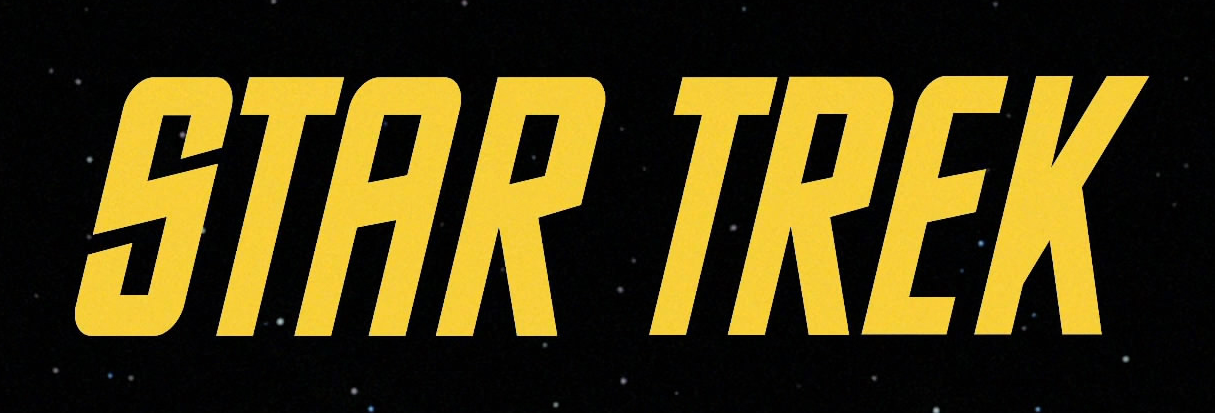
—
Normally, we run our Star Trek coverage on TREK TUEDAYS (click here), but there’s lots to come on that front and I wasn’t going to stand on ceremony where an interview with George Takei is concerned, so here we go …
—
I recently visited the Starfleet Academy Experience — an exhibit at the Intrepid Museum on Manhattan’s West Side, timed to the 50th anniversary of Star Trek’s 1966 debut. It’s pretty great, featuring a replica of the Enterprise-D bridge, interactive stations where you can hone your phaser skills or take the Kobayashi Maru test, and you can check out props and costumes from the last five decades. (Click here.)
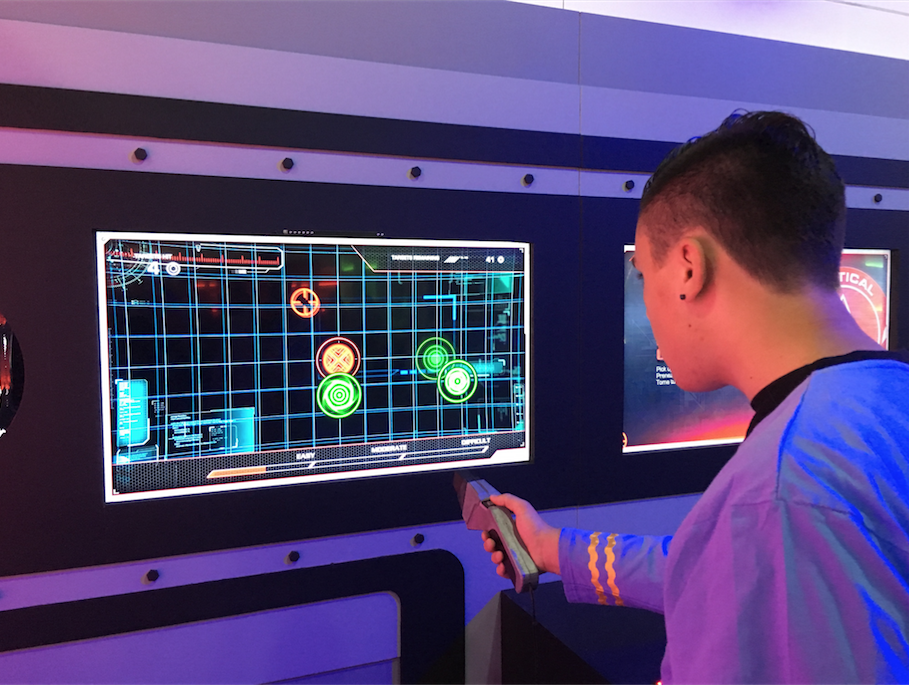
Phasers on stun!
George Takei was there that day and I got a chance to talk to him. It was, to quote a different character, fascinating. We talked less about Trek intricacies and more about his legacy, which is one of being an actor, yes, but also of being an activist for social justice — fitting given the show’s classic themes of equality.
We talked about his own experience as a Japanese-American child during World War II and how that tracks with the plight of Muslims in today’s climate. As we spoke, I began thinking of Gene Roddenberry’s vision of a diverse bridge 50 years ago, so I said:
“I was thinking about it as you were talking, that you know with the new Star Trek TV show coming, it might make a lot of sense to have a Muslim character on the bridge. Because I don’t think that’s ever happened before on Star Trek.”
And Takei, replied: “I think that would be very important because that would represent a major part of the diversity of this planet.”
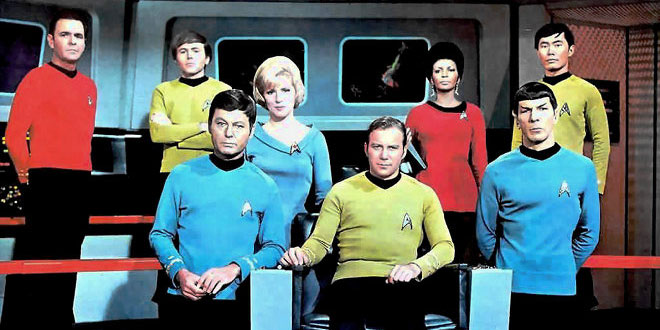
Star Trek has largely shied away from overt depictions of religion. Dr. Julian Bashir from Deep Space Nine was an Arab but his religion was never really explored. Perhaps that will change. Perhaps not.
But it’s an interesting issue to explore in the 21st century — and the 23rd.
Below is the full transcript of our conversation, which started with a brief discussion of Takei’s exhibit at the Japanese American National Museum in Los Angeles. The exhibition will end in August, then go on tour, Takei said.
(NOTE: This conversation took place just a couple days before it was announced that John Cho’s version of Sulu in Star Trek Beyond would be revealed to be gay — to the consternation of George Takei. Takei, who is gay, spoke to The Hollywood Reporter about that the other day (click here). Naturally, I would have loved to have followed up on that…)
—
Dan Greenfield: Now, what’s included in the (Japanese-American museum) exhibit?
George Takei: Well, most importantly, my Starfleet — or my captain’s — uniform, from Star Trek VI: The Undiscovered Country and a lot of other artifacts from my life. We were incarcerated in the swamps of Arkansas and my father went out — swamps have these cyprus trees that snake in and out of the water. He cut one of them off, boiled it, and peeled the bark off. It’s a magnificent sculpture by Mother Nature. And so that’s a piece that’s been in my study since my father passed, so other artifacts from my family will be in that exhibit.

Dan: Now, you started the show 50 years ago as a supporting character. Now, 50 years later, you have museum exhibits about you. Tell me a bit about what that journey is like. To start from one place and find yourself celebrated with that kind of tribute.
George: Well, when I look back on my life as the museum has been doing, it does seem to be an epic American life. Something that’s a shameful chapter of America when American citizens of Japanese ancestry were put into prison camps, barbed-wire prison camps with no charges.
You know, the central pillar of our justice system is when you’re arrested, you’re entitled to know why you’re arrested. There were no charges. It was — you look around and it’s all Japanese-Americans. So, you understand why, but we could never challenge in a court of law because it was never an official charge and so that critically important chapter of my American history is how my life began.
And certainly after the war when suddenly we were free, you know that gates were opened. But we were poverty stricken, they took everything from us. My father’s business, our home, our bank accounts, everything. And so, our first home was on Skid Row, in Downtown L.A., which was a terrifying experience for us kids. I was 8 1/2 by then, almost 9.
And through my father’s — my parents’ hard work — working their fingers to the bones, they were able to put a down payment on a three-bedroom house. Four years later, when I was a teenager, I was curious about my childhood imprisonment, when in school, I was reading about the shining ideals of our democracy. All men are created equal, endowed with an inalienable right to life, liberty, and the pursuit of happiness.
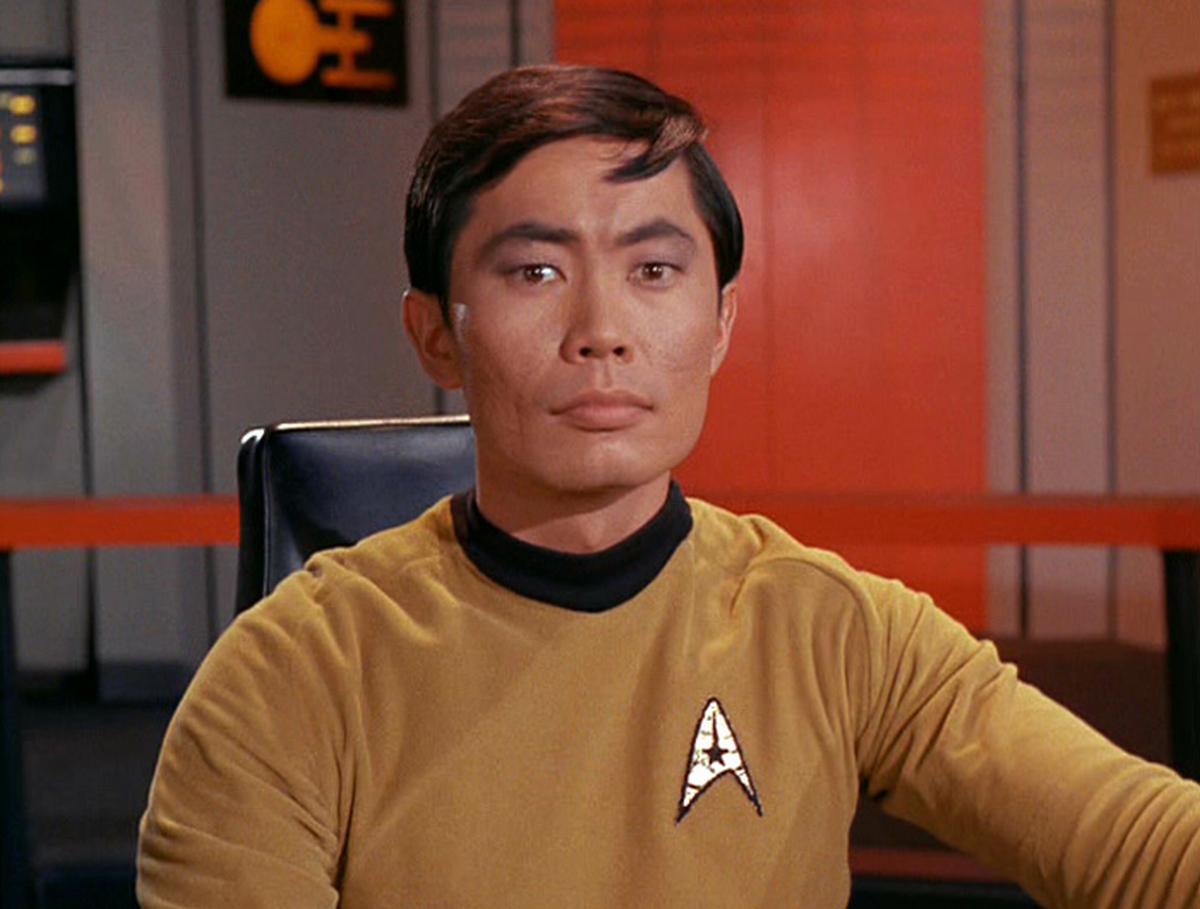
And, my father explained our democracy to us, that it’s made up of people, people who have the capacity to write those shining ideas, but also fallible human beings, and great men were fallible. The president of the United States, the governor of California, the attorney general of California, who went on to be the chief justice of the Supreme Court, Earl Warren, the great liberal chief justice.
So, great men can make mistakes. They’re human and he taught me that our democracy is vitally dependent, existentially dependent on people who cherish the ideals of democracy and actively engage in the process. And he took me downtown to the Adlai Stevenson for President campaign headquarters and introduced to me how our democracy works and ever since that time I have been an activist in the political arena, so that’s another chapter in my life.
I was involved in social justice campaigns, civil-rights movements, I marched with Dr. Martin Luther King, met him, shook his hand, chatted with him, which was a thrill. During the Vietnam War, I was a part of the peace movement. The EIPJ – the Entertainment Industry for Peace and Justice — was an organization I was a member of.
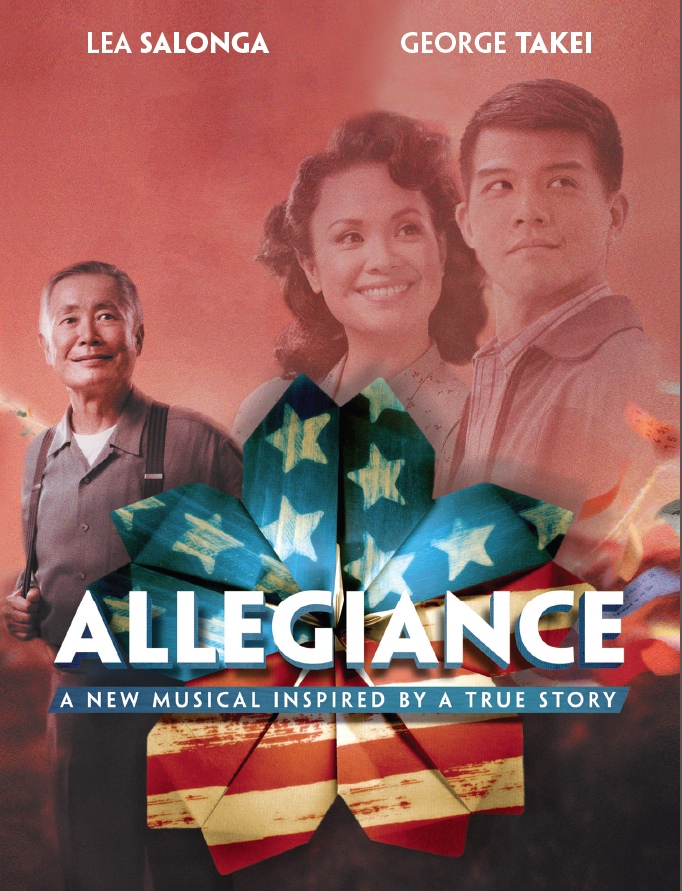
Dan: Given your upbringing then, do you find today’s political rhetoric, particularly with the presidential campaign, to be especially chilling with some of the things that have been going on?
George: Indeed, it is. Because it was the same mentality that has Donald Trump making those statements about immigrants coming from South of the Border and a need to build a wall or making those sweeping statements about Muslims being bad. Now, he’s backtracking on it, but you know there are millions and millions of Muslims on this planet. And, they’re not terrorists. You know only a tiny sliver of the unhinged radicalized crazies are the terrorists.
And to characterize everybody like that just like — you know, we’re American – innocent American citizens — and we were imprisoned because we looked like the people who bombed Pearl Harbor. The same mentality. And so, we haven’t been learning from our American history. And that’s why we did “Allegiance,” the Broadway musical. And when he made that Muslim statement, I extended an invitation for Donald Trump to come see “Allegiance.” He could learn from American history.
Dan: He didn’t take it up on you, did he?
George (smiling): He did not, but it became a great marketing ploy because we had a great big sign on an aisle seat, announcing “This Seat Reserved for Mr. Donald Trump.” And we had a countdown on the number of performances that he missed and he never came. But people, during intermission, people were coming down, lining up, squatting down beside that seat and taking selfies, so it helped sell tickets.
But, from that, I’ve shifted now over to social media and that’s given me another chapter of my life and so all these chapters will be exhibited now at the Japanese American National Museum.
Dan: It sounds to me that basically what you were saying, I was thinking about it as you were talking, that you know with the new Star Trek TV show coming, it might make a lot of sense to have a Muslim character on the bridge. Because I don’t think that’s ever happened before on Star Trek.
George: I think that would be very important because that would represent a major part of the diversity of this planet.
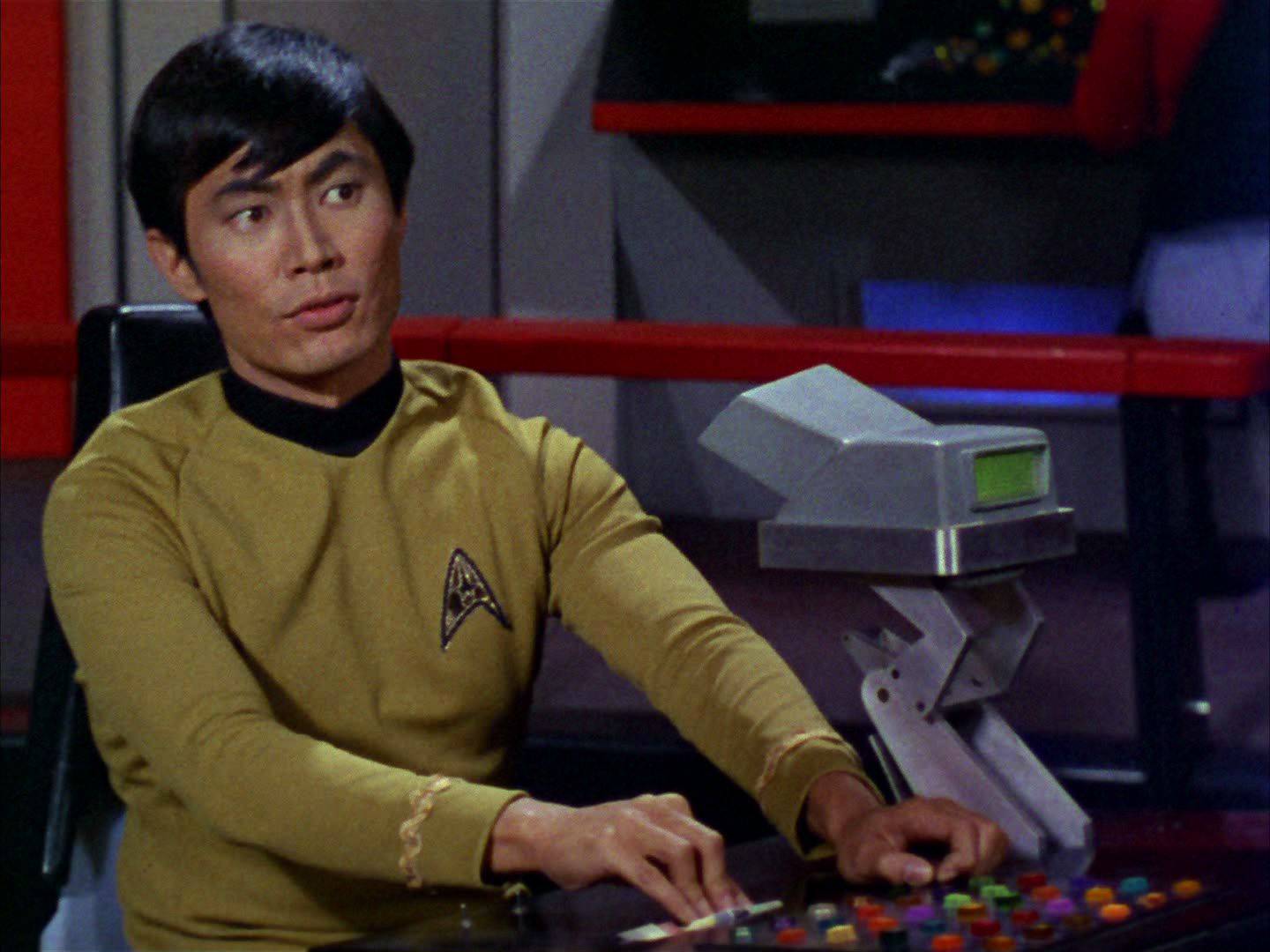

July 10, 2016
Probably more important for Paramount to pull their heads out of their asses regarding the treatment of the fans
July 10, 2016
none of the TOS characters expressed any religious beliefs except maybe Kirk’s one comment…”We find the one god enough.” Other than that and maybe Spock’s Vulcan beliefs, there was never a time where anyones religious beliefs were discussed Having a Muslim on the show would be just pandering to a group and I hope they never do that.
July 10, 2016
They had the opportunity to have a man of Muslim faith (or that area of the world – that is at least what I thought they were going for) in that first JJ Trek movie and he turned out to be a weak and ineffectual captain of his ship, getting killed early on. They missed the boat big time. It’s yet another reason (among many) I thought the JJ Trek movies were bad.
July 11, 2016
I honestly don’t recall any current religions to be recognized on the show. They always seemed to gloss over religion in all of the series unless it was a visiting race or character. Definitely I do not remember someone playing a character from the middle East ever being played by someone from the middle East. That is odd considering the modern post 90s versions and films.
July 11, 2016
In fact Dr. Julian Bashir on DS9 is established as being of Arabic background, and was played by Alexander Siddig, who was born in Sudan under the name Siddig El Tahir El Fadil El Siddig Abderrahman Mohammed Ahmed Abdel Karim El Mahdi.
July 12, 2016
Bashir was Arab. Arab and Muslim are not the same. The actor himself has said that he didn’t self-identify as Muslim until after the show ended. Bashir’s religion was not a plot point of the show.
July 12, 2016
In “Bread and Circuses” Uhuru monitors the planet’s communications and recognizes that they’re speaking of “The son of God”, …”not the son up in the sky”. I always registered her observation as being pleased and having hope in her voice. Kirk, a little bit more detached, then replies,…”Caesar and Christ. They had them both. And the word is spreading only now.”
There’s also the fact that the Enterprise has a chapel for services such as the wedding (that didn’t happen) in “Balance of Terror”. The show was not totally devoid of religious references, or in my opinion, beliefs.
July 10, 2016
So I commented a link to a video Picard talking about region. But because it was a link I think it was marked as spam and deleted. So here’s what he said it text for those who care.
Captain Jean-Luc Picard: “Horrifying. Dr. Barron, your report describes how rational these people are. Millennia ago, they abandoned their belief in the supernatural. Now you are asking me to sabotage that achievement, to send them back into the dark ages of superstition and ignorance and fear? NO!”
July 10, 2016
I don’t think it would make much sense. Throughout the various incarnations of Trek it’s pretty consistently taken the position that humanity has moved past religious belief. This was certainly Roddenberry’s vision, at least. There’s still the deistic believer here and there, but in the Star Trek universe (human) organized faiths such as the Abrahamic ones are long since defunct.
July 11, 2016
Why are Latinos/Hispanics overlooked? There is extreme lack of representation.
July 12, 2016
KHAAAAAAN!
July 12, 2016
Rodriguez showed up briefly in “Shore Leave”.
July 13, 2016
…but Roddenberry was a humanist and had rejected religion, which is why when you watch TOS and the TNG series up until his death, storylines involving gods or religious figures are shown as corrupt, as charlatans, or evil in some form. He didn’t have a problem with god/gods, which is why characters occasionally muse about the subject. It was his belief in the Star Trek universe, that humanity would have grown beyond religion by the 23rd century that it would be irrelevant to human culture at that point. To suggest a portrayal of any human religion in Star Trek is to show a significant lack of understanding about the show’s creator. If you want religion mixed in with your Sci Fi, try Babylon 5. J. Michael Straczynski did a good job of representing human religious culture that had evolved beyond sectarianism.
July 13, 2016
Picard: Your report describes how rational these people are, Millenia ago, they abandoned their belief in the supernatural, now you are asking me to *sabotage* that achievement!? to send them back into the *dark ages* of superstition and ignorance and fear!? *NO!*
October 11, 2016
In Star Trek chronology, there were two major wars on Earth between the current era and then: the Eugenic Wars and World War III. In both we are told millions died. Is it possible Arabic people suffered a disproportionate amount of deaths in those wars and no longer exist in Star Trek’s time. Also though some ethnic groups do appear is it possible certain continents and areas were depopulated and the ones who appear could be immigrants to other countries who survived. Also the Xindi removed part of Florida to Venezuela and probably took out Cuba, Haiti, and the Dominican Republic. Just a thought.